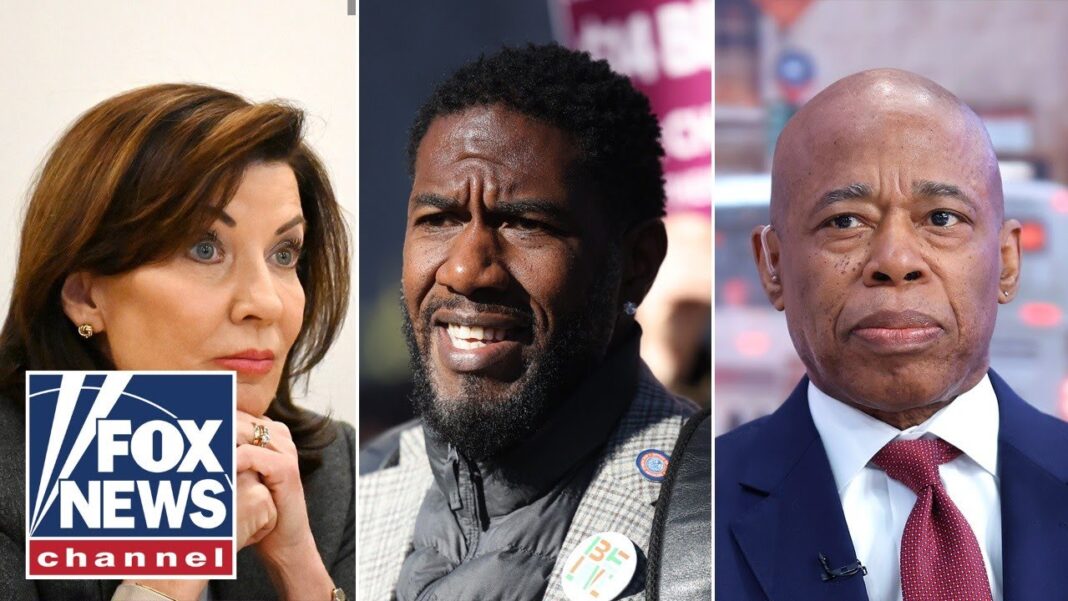|
Getting your Trinity Audio player ready...
|
(TJV) As Mayor Eric Adams’ administration spirals into crisis, the possibility of Public Advocate Jumaane Williams stepping in as interim mayor looms larger. With Adams facing a federal corruption probe, mass resignations among his top officials, and growing calls for his removal, many are asking: Could New York City survive even a few months under a staunch progressive like Williams?
The speculation took center stage at a recent Greenwich Village event when an audience member bluntly asked Williams, “Are you ready to be mayor?” The crowd’s cheers—and Williams’ telling smile—underscored the mounting uncertainty around City Hall. As the first in the line of succession, Williams would temporarily take the reins if Adams steps down before March 26, triggering an 80-day interim leadership period before a special election.
Williams, a self-described activist-elected official, has long been a champion of progressive causes, from police reform to tenant protections. His track record includes multiple arrests in acts of civil disobedience, a failed progressive challenge to Governor Kathy Hochul, and a reputation for pushing City Hall leftward. If Adams’ centrist leadership crumbles, Williams could usher in a dramatically different ideological approach to governing the city.
While Williams has publicly stated that he is not actively seeking the mayor’s office, he has privately begun making preparations in case Adams is removed or steps down. He has reportedly reached out to three of the four departing deputy mayors, asking whether they would reconsider resigning if he were to take over. At least one has indicated they would stay under Williams’ leadership, signaling that the public advocate is thinking ahead.
Despite these quiet preparations, the Adams administration has been dismissive of Williams’ potential rise to power. Kayla Mamelak Altus, a spokesperson for the mayor, dismissed the idea outright, telling The New York Times: “Luckily for the people of this city, Jumaane Williams is not—and is never going to be—mayor.”
Williams, however, has not shied away from publicly critiquing Adams’ handling of city affairs. In a February 13 memo to city agency heads, he outlined his official role in the event of Adams’ removal and urged city officials to lead impartially. In that memo, Williams pointedly referred to Adams’ leadership as a “dereliction of duty,” signaling his firm stance that a course correction is needed in City Hall.
Williams’ progressive reputation would set a stark contrast to Adams’ more centrist governance, raising questions about how much change he might be able to enact in what would be a short-term leadership position. His tenure as public advocate has been marked by strong advocacy for police reform, tenant protections, and economic justice—an approach that would likely clash with the pro-business, law-and-order policies that have defined Adams’ mayoralty.
Adams, however, isn’t going down without a fight. He has dismissed Williams as an unserious contender, quipping at a Brooklyn church service: “If I step down, the public advocate becomes the mayor. So, can you imagine turning the city over to that?” Williams, never one to shy away from a political brawl, shot back on social media, playfully rebutting Adams’ digs at his work ethic.
The growing feud highlights the larger battle within the Democratic Party—moderates like Adams clashing with the progressive wing Williams represents. If Adams’ administration collapses, the city could be in for a radical leftward shift, at least temporarily. The only question is: Could New York survive it?





Oh yeah, we really need another angry black in glasses running this city into the ground like Chicago, etc. Zer lessons learned, apparently.
NYC under Blumberg allowed corruption in the building of the Croton water treatment plant in the Bronx. What Mayor Eric Adams did was wrong wrong. But will not jeopardise the water supply to NYC!
The Croton corruption one day will compromise the flow of water to Manhattan.
Hope not
Williams will kill the city completely